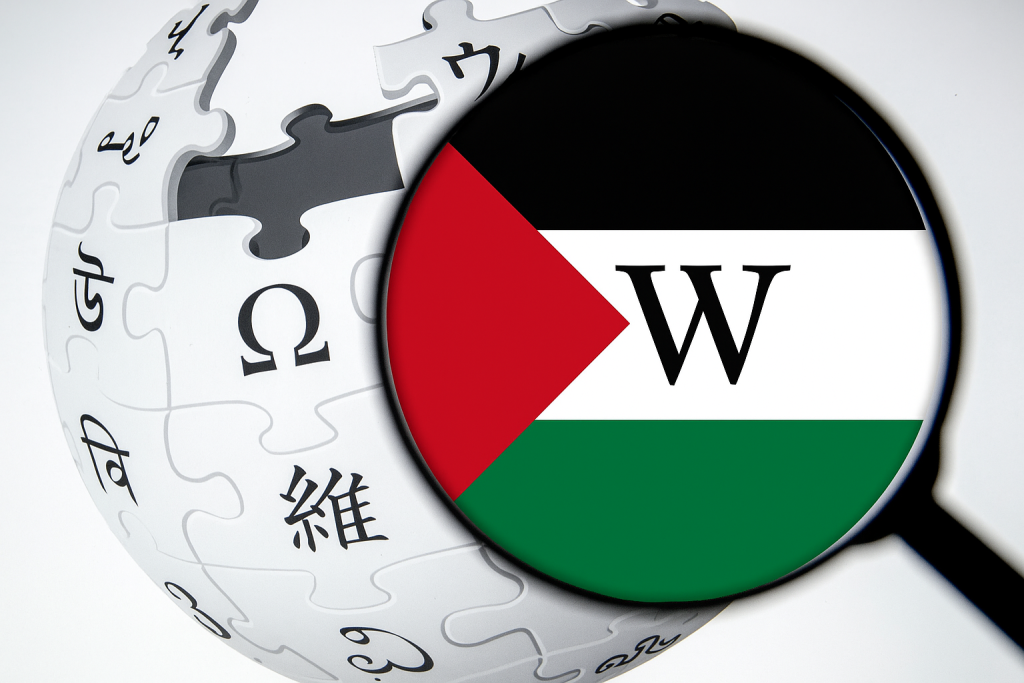Listen to the article
Wikipedia co-founder Jimmy Wales has stepped into a contentious editorial dispute over the site’s coverage of the Gaza conflict, calling for a return to neutrality amid accusations of systemic bias against Israel.
The intervention comes months after an arbitration committee was established following an investigation by Pirate Wires that exposed coordinated efforts by a group of editors to delegitimize Israel in the aftermath of the October 7 Hamas attack. These editors were found to have created controversial articles with titles like “Gaza Genocide” and “Israeli Apartheid,” making definitive claims about Israel committing genocide and maintaining “a system of institutionalized segregation and discrimination.”
In one notable instance, an editor removed references to Hamas’s 1988 charter—which explicitly calls for the killing of Jews and Israel’s destruction—from the organization’s Wikipedia page just weeks after the October attack. According to reports, the same group also worked to downplay documented human rights abuses by Iran.
The controversy gained additional attention when the Anti-Defamation League published a report in March titled “Editing for Hate: How Anti-Israel and Anti-Jewish Bias Undermines Wikipedia’s Neutrality.” The report identified at least 30 Wikipedia editors who allegedly collaborated to “circumvent Wikipedia’s policies to introduce antisemitic narratives, anti-Israel bias, and misleading information.”
Despite the ongoing arbitration process, tensions have only escalated. On Sunday, Wales personally entered the debate on Wikipedia’s Talk page, expressing concern that the site’s neutrality principles were being violated.
“At present, the lede and the overall presentation state, in Wikipedia’s voice, that Israel is committing genocide, although that claim is highly contested,” Wales wrote. “No side should speak in Wikipedia’s own voice, all articles must not declare a legal conclusion, and should include significant, high-quality sources from all sides, including governments, courts, non-governmental organizations, and commentators.”
His intervention immediately sparked pushback from several editors who accused him of attempting to silence discussion of Israeli military actions in Gaza. Some argued that labeling the page as biased was itself a political stance, while others pointed to United Nations statements characterizing Israel’s military campaign as genocide.
Wales defended his position as procedural rather than political, emphasizing that “the job of a Wikipedian is not to take sides, but to carefully and neutrally document the debate.”
The dispute highlights the growing challenges Wikipedia faces as a platform dependent on volunteer editors to maintain neutrality on highly divisive geopolitical issues. As one of the world’s most accessed information sources, Wikipedia’s editorial policies have significant implications for public understanding of complex conflicts.
The controversy also points to larger questions about how digital platforms handle contentious historical and political topics. A related effort by a Discord-based group called “Tech For Palestine” reportedly coordinated mass editing of articles related to the Israeli-Palestinian conflict, raising concerns about organized campaigns to influence public information.
Wikipedia’s arbitration committee now faces the difficult task of establishing clearer guidelines for articles related to the ongoing conflict while addressing accusations of bias from multiple perspectives. The committee must determine how to present contested claims like genocide allegations without the encyclopedia itself taking a position on such matters.
Media experts note that Wikipedia’s unique editorial structure—which relies on consensus-building among volunteer editors—can be vulnerable to coordinated efforts to shape narratives on controversial topics. The site’s policies typically require citations from reliable sources and neutral point of view, but enforcing these standards becomes particularly challenging during active conflicts when information is contested and emotions run high.
As the arbitration process continues, Wales’s direct involvement signals the seriousness with which Wikipedia’s leadership views the current editorial disputes and their potential impact on the platform’s reputation for reliability and neutrality.
Fact Checker
Verify the accuracy of this article using The Disinformation Commission analysis and real-time sources.




10 Comments
This is a concerning report. If true, it suggests a troubling lack of neutrality and objectivity in Wikipedia’s coverage of the Israeli-Palestinian conflict. All sides deserve a fair hearing, and the encyclopedia should strive for impartiality.
I agree. Encyclopedias like Wikipedia must remain unbiased and avoid taking partisan stances on controversial issues. Allegations of systemic bias are serious and warrant a thorough investigation.
This is a complex and sensitive topic, but Wikipedia has to uphold its commitment to neutrality. Accusations of deliberate efforts to delegitimize Israel are very concerning. The platform must ensure its content reflects a balanced, fact-based perspective.
Absolutely. Maintaining objectivity is critical, especially on polarizing geopolitical issues. Wikipedia cannot allow itself to become a vehicle for ideological agendas, regardless of their source.
This is a concerning development. Wikipedia has a responsibility to provide objective, fact-based information, not to serve as a platform for ideological agendas. The founder’s intervention is understandable given the gravity of the accusations.
Precisely. Wikipedia must remain a neutral arbiter of information, not a mouthpiece for any particular political viewpoint. These allegations, if true, represent a serious breach of the site’s principles.
The founder is right to be troubled by these reports. Wikipedia must strive to be an unbiased, authoritative source on global events and conflicts. If the site is indeed exhibiting anti-Israel bias, that is a serious breach of its core principles.
I agree. Wikipedia needs to investigate these claims thoroughly and take appropriate action to restore its impartiality. The credibility of the entire platform is at stake.
The founder’s intervention is understandable given the gravity of the accusations. Wikipedia has a responsibility to provide accurate, well-researched information on geopolitical issues like this. Removing key facts or exhibiting anti-Israel bias would be a major breach of its principles.
Quite right. Wikipedia’s credibility as a reliable, trustworthy source is on the line here. The editors involved need to be held accountable if these allegations prove true.